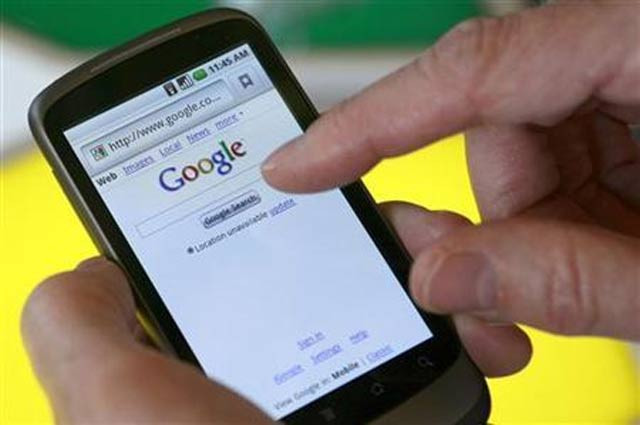How much smarter are you than your smartphone, really?
Today, smartphones are a part of our bodies. A limb

Today, smartphones are a part of our bodies. A limb. PHOTO: REUTERS
Start by thinking about what your life was like before you had a smartphone. How did you communicate? How did you read the news? How did you take photos? How did you learn? How did you see the world? What did you think was an attainable goal in life? I know, so many questions.
Studying Pakistan’s growing obsession with smartphones
But that’s what you have to think about. Today, smartphones are a part of our bodies. A limb.

I mean, check out this dude. He went out and shopped for a new addition to his body, so he could shove his face into his phone for longer periods of time without having to lift his hands. 100 percent genuine leather by the way.
I used to get anxious when my phone died. My mind would start to race. I would start to smell weird things like flowers and car fumes. My ears would tremble, vibrations piercing my head with sounds of life, like the leaves dancing on the tree or the horn of a car that just can’t seem to disappear for more than ten seconds. I would rush, looking for those two magical holes in the wall where I could plug my phone probe and get charged again. Looking back and forth, counting the seconds turn into minutes until, finally.
It’s almost like, when we reach into our pockets or purse, and pull out the phones, we become disconnected, not connected. It’s crazy to look at it this way, and it’s even crazier coming from a guy who’s the founder of an iOS startup. But today, that’s the way the cookie crumbles. It’s our lives, and we have to be selective about what we do with these “smartphones”. Not just as users, but as founders, engineers and the whole community contributing to its core.
Let’s get to the point
Information is accessible. I have no doubt about that, and you shouldn’t either. Our globalised economy has made great leaps in sharing information to the far corners of the earth. The internet has been the transport truck on eighteen wheels delivering this superabundance of information to anyone who can access the internet.
Telecom sector: Pakistan to have 40 million smartphones by end of 2016
But, with gold comes bloodshed
This “bloodshed” that I am referring to is the devil on earth, misinformation. Misinformation has shaken economies and made us look like complete idiots when we reference an article that we read on our phones stating that eating apple cores are good for you. When in fact, the seeds actually contain cyanide, and if you eat like 200 seeds or whatever, you die. Regardless, this distribution of misinformation happens. It’s happened to me, and it doesn’t feel good.
You have a choice. Read it, tap it, read further and decide whether it goes into your mental folder of wisdom or dump it in the trash and quickly empty that shit.
Before the age of smartphones, you would read a newspaper, backed by a journalist who has at least hopefully done some research, or referenced the textbook you read with your biology teacher stating yes, apple seeds do contain cyanide, so don’t go buy a bag of apple seeds and eat them all at once.
The point I am trying to make here is that today, more than ever, we consume a lot more information that we are used to. And since we are going through the teenage phase of this era, we don’t quite know how to process it; which articles not to take seriously and which we can act upon.
But it doesn’t stop there
Every week, more and more developers are entering their products into the app market place. I’ve have done the same myself. Sure, you gain some sort of cognitive growth when you learn how to flap that bird all the way to a high score, and sure, you’re now more organised with this calendar app and can be more productive! But how much time do you dedicate to your calendar and how much to the bird?
When developing our app, I would speak to founders, entrepreneurs and engineers all the time. Something that was very disappointing and sometimes even scary was a common mentality when thinking about innovative ways to change our world.
Did you know? Smartphones can make you hyperactive
Very similar to the ‘Push vs. Pull’ system, a lot of decision makers in this industry believe that you are lazy. You won’t meet them halfway on an effort, you won’t go out of your way to make something awesome happen, you don’t care, you’re just lazy. So they make products for you with that mentality. What happens is, you become lazier than you were previously. Regardless if you were lazy or not, with their product, they make you lazier.
Don’t believe me? Take a look for yourself
Decider app – Can’t make a decision between “Harvard or Stanford”?
Crowdmug – Pay and see if your favourite bar is bumping or empty.
Swifto – Bought a dog? Don’t want to take on the actual responsibility of owning one? Have someone walk the damn dog for you everyday.
Here comes my conclusion.
Don’t listen to anything I said, it’s all bs.
Or is it? You decide.
This article originally appeared on Tech in Asia



















COMMENTS
Comments are moderated and generally will be posted if they are on-topic and not abusive.
For more information, please see our Comments FAQ